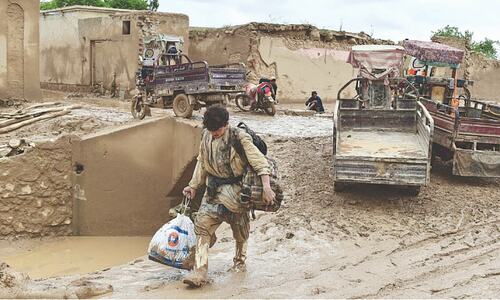NEW DELHI: It doesn’t matter what colour the cat as long as it catches mice. The late Chinese strongman Deng Xiaoping’s astute aphorism has guided Beijing’s foreign policy for decades and it was in evidence in New Delhi on Thursday where Chinese President Xi Jinping held his first formal talks with Prime Minister Narendra Modi.
The two leaders had met earlier during the BRICS summit in Brazil where they struck a rapport.
Mr Modi reciprocated the fact that Mr Xi agreed to begin his visit from the prime minister’s home state of Gujarat on Wednesday, which happened to be the host’s birthday. Mr Modi on his part broke protocol by receiving Mr Xi at the hotel in Ahmedabad.
However, contrary to the local spin being given to Mr Xi’s genial manners – reports even cited his savouring a yoghurt drink in Gujarat even though the majority of Chinese shun dairy products as culturally inferior – there was little to suggest that Deng’s cat had lost its nose for discerning a good enterprise.
It could hardly be a hindrance that an ally got overthrown, say in Nepal, where the king was toppled by a Maoist-led revolt. The Maoists were befriended with equal ease. The cat simile has worked for China with everyone in power on a given day in Pakistan, be they civilian or military rulers.
India is no different. Mr. Xi Jinping is the third Chinese president to visit Delhi alternating with the equally regular prime ministerial visits. Starting with former prime minister Rajiv Gandhi’s trip to Beijing in 1988 to revive disrupted ties with a famous handshake with Deng, both sides have dealt with each other with ease tempered with caution.
Indian leader Narasimha Rao’s 1993 visit to Beijing was perhaps the most groundbreaking of post-1962 interactions when he and Chinese premier Li Peng signed the landmark agreement on keeping their borders peaceful and tranquil.
That both sides have largely succeeded in pursuing the objective is a tribute to everyone in Beijing and New Delhi who has steered the relations, though this could never mean that stray border incidents have not occurred.
Things did flare up as recently as under Dr Manmohan Singh’s watch, for example, only to be doused with routine ease by both sides. There were reports of a border incident even as Mr Xi held talks with Mr Modi.
Speaking to reporters after the meeting, Mr Modi said: “I also suggested that clarification of LAC would greatly contribute to our efforts to maintain peace and tranquillity and requested President Xi to resume the stalled process of clarifying the LAC”.
Characteristically, following the reported incidents, China called for a negotiated resolution of the border issue, shifting the focus on the root cause of problem. Its foreign ministry’s comment followed some latest incidents in Chumar and Demchok, along the Line of Actual Control (LAC), Indian reports from Beijing said.
They quoted Chinese Foreign Ministry spokesman Hong Lei as saying during his regular briefing on Thursday that the incident along the border, to which both China and India attach great importance “has been effectively controlled with immediate effect” and “managed”. But, he added: “China hopes to continue to work with the Indian side to safeguard peace and tranquillity in the border area and solve the border issue through consultation and dialogue.”
According to The Hindu, the spokesman’s nuanced emphasis on the resolution of the border issue echoed remarks by President Xi in India that “China has the determination to work with India through friendly consultation to settle the boundary question at an early date.”
In dealing with a complex relationship, which has its areas of agreement and differences, the Chinese appear to have amplified their pitch on holding a pervasive dialogue with India at all levels in the hope of building consensus, the newspaper said.
In an assessment of the bilateral ties ahead of his visit, Mr Xi had described India as Asia’s third largest economy and the world’s second largest exporter of software and agriculture products. A member of the United Nations, the G20, the BRICS and other organisations, India is playing an increasingly important role in the regional and international arena, he wrote in The Hindu.
The “Story of India” has spread far and wide, he noted. “With the new government coming into office, a new wave of reform and development has been sweeping across India, greatly boosting the confidence of the Indian people and attracting keen international interest in its opportunities.”
China has become India’s largest trading partner, with their bilateral trade volume increasing from less than US$3 billion early this century to nearly US$70 billion.
Published in Dawn, September 19th, 2014














































Dear visitor, the comments section is undergoing an overhaul and will return soon.